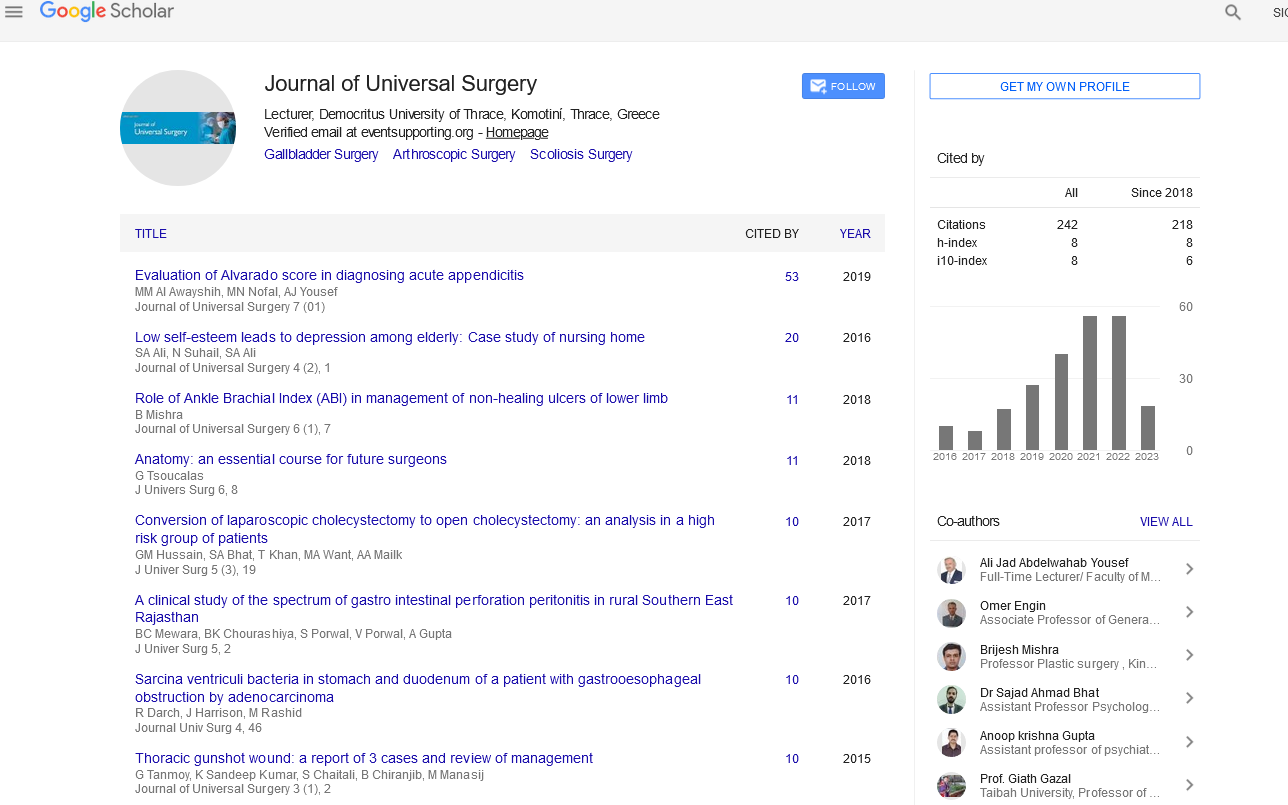Perspective - (2024) Volume 12, Issue 2
Understanding Long-term Complications of Neck Surgery
Martha Zenlico*
Department of ENT, Hunspach Unversity, Hunspach, France
*Correspondence:
Martha Zenlico, Department of ENT, Hunspach Unversity, Hunspach,
France,
Email:
Received: 28-Mar-2024, Manuscript No. IPJUS-24-14719;
Editor assigned: 01-Apr-2024, Pre QC No. IPJUS-24-14719 (PQ);
Reviewed: 15-Apr-2024, QC No. IPJUS-24-14719;
Revised: 23-Apr-2024, Manuscript No. IPJUS-24-14719 (R);
Published:
30-Apr-2024
Introduction
Neck surgery, though often necessary for various medical
conditions, is not without its risks and potential long-term
complications. While advancements in surgical techniques have
significantly reduced the occurrence of complications, patients
and healthcare providers must remain vigilant about the
potential risks associated with these procedures. In this article,
we will explore the common long-term complications of neck
surgery, their causes, and possible management strategies.
Description
Chronic pain: One of the most prevalent long-term
complications following neck surgery is chronic pain. This can
result from nerve damage, scar tissue formation, or incomplete
healing of the surgical site. Chronic pain can significantly impact
a patient's quality of life, affecting their ability to perform daily
activities and causing emotional distress.
Nerve damage: Damage to nerves during surgery can lead to
long-lasting neurological deficits, such as weakness, numbness,
or tingling in the arms or hands. This can result from accidental
injury to nerves during the surgical procedure or from postoperative
scar tissue compressing nerves.
Reduced range of motion: Neck surgery can sometimes lead
to a reduction in the range of motion of the neck. This limitation
can be caused by fusion of cervical vertebrae or the formation of
scar tissue around the surgical site. Restricted neck movement
can affect a patient's ability to perform tasks that require turning
or bending the neck.
Dysphagia: Difficulty swallowing, known as dysphagia, can
occur after neck surgery due to damage to the muscles or
nerves involved in swallowing. This complication can
significantly impact a patient's ability to eat and drink
comfortably, leading to nutritional deficiencies and weight loss if
left untreated.
Voice changes: Surgery on the neck, particularly procedures
involving the thyroid gland or vocal cords, can sometimes result
in changes to the patient's voice. This may manifest as
hoarseness, weakness, or altered pitch. Voice changes can be
temporary or permanent, depending on the extent of the
surgical intervention and the individual's healing process.
Infection: While relatively uncommon, infection can occur
following neck surgery, leading to long-term complications if not
promptly treated. Deep tissue infections can cause chronic pain,
swelling, and fever, requiring aggressive antibiotic therapy and
sometimes additional surgical intervention to resolve.
Hardware failure: In cases where implants or hardware are
used to stabilize the cervical spine, there is a risk of hardware
failure over time. This can occur due to factors such as loosening
of screws, fracture of plates, or dislodgement of implants.
Hardware failure may necessitate revision surgery to repair or
replace the affected components.
Adjacent segment degeneration: Following neck surgery,
there is a risk of accelerated degeneration of adjacent spinal
segments. This can result from altered biomechanics of the
cervical spine due to fusion or artificial disc replacement.
Adjacent segment degeneration may manifest as worsening
neck pain, stiffness, and neurological symptoms over time.
Management of long-term complications
Effective management of long-term complications following
neck surgery requires a multidisciplinary approach involving the
patient's primary care physician, orthopedic surgeon,
neurologist, and physical therapist. Treatment strategies may
include:
Pain management: Utilizing a combination of medications,
physical therapy, and alternative therapies such as acupuncture
or chiropractic care to manage chronic pain.
Nerve rehabilitation: Physical therapy and occupational
therapy aimed at improving nerve function and reducing
symptoms of numbness or weakness.
Swallowing therapy: Working with a speech therapist to
improve swallowing function and prevent complications
associated with dysphagia.
Voice therapy: Engaging in voice exercises and vocal hygiene
practices under the guidance of a speech-language pathologist
to address voice changes.
Infection control: Prompt identification and treatment of
infections with appropriate antibiotics and wound care to
prevent long-term complications.
Revision surgery: In cases of hardware failure or progressive
degeneration, revision surgery may be necessary to address the
underlying issue and improve outcomes.
Conclusion
While neck surgery can provide relief from debilitating
symptoms and improve quality of life for many patients, it is
essential to acknowledge the potential for long-term
complications.
By understanding the risks associated with these procedures
and implementing appropriate management strategies,
healthcare providers can optimize outcomes and minimize
the impact of complications on patients' lives. Close
monitoring and ongoing communication between patients and
healthcare providers are crucial for early detection and
intervention in case of any complications arising post-surgery.
Citation: Zenlico M (2024) Understanding Long-term Complications of Neck Surgery. J Univ Surg Vol.12 No.2: 017.





